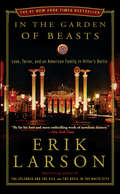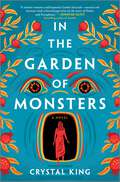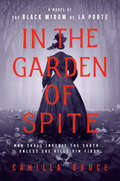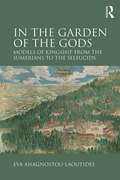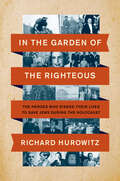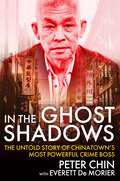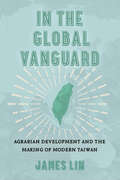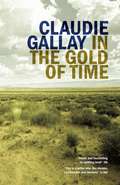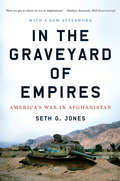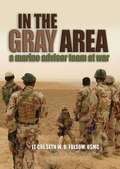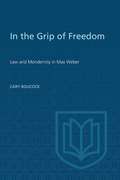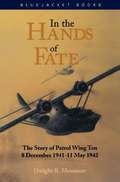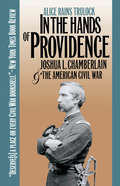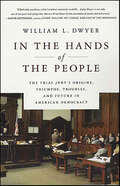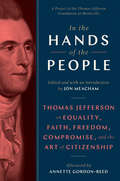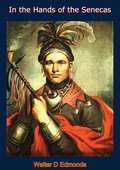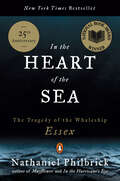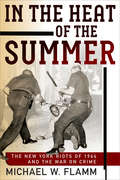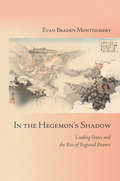- Table View
- List View
In the Full Light of the Sun
by Clare ClarkIn the Full Light of the Sun follows the fortunes of three Berliners caught up in a devastating scandal of 1930s' Germany. It tells the story of Emmeline, a wayward, young art student; Julius, an anxious, middle-aged art expert; and a mysterious art dealer named Rachmann who are at the heart of Weimar Berlin at its hedonistic, politically turbulent apogee and are whipped up into excitement over the surprising discovery of thirty-two previously unknown paintings by Vincent van Gogh.Based on a true story, unfolding through the subsequent rise of Hitler and the Nazis, this gripping tale is about beauty and justice, and the truth that may be found when our most treasured beliefs are revealed as illusions. Brilliant on authenticity, vanity and self-delusion, it is a novel for our times.
In the Full Light of the Sun
by Clare ClarkIn the Full Light of the Sun follows the fortunes of three Berliners caught up in a devastating scandal of 1930s' Germany. It tells the story of Emmeline, a wayward, young art student; Julius, an anxious, middle-aged art expert; and a mysterious art dealer named Rachmann who are at the heart of Weimar Berlin at its hedonistic, politically turbulent apogee and are whipped up into excitement over the surprising discovery of thirty-two previously unknown paintings by Vincent van Gogh.Based on a true story, unfolding through the subsequent rise of Hitler and the Nazis, this gripping tale is about beauty and justice, and the truth that may be found when our most treasured beliefs are revealed as illusions. Brilliant on authenticity, vanity and self-delusion, it is a novel for our times.
In the Garden of Beasts: Love, Terror, and an American Family in Hitler's Berlin
by Erik LarsonErik Larson, New York Times bestselling author of Devil in the White City, delivers a remarkable story set during Hitler&’s rise to power.The time is 1933, the place, Berlin, when William E. Dodd becomes America&’s first ambassador to Hitler&’s Nazi Germany in a year that proved to be a turning point in history. A mild-mannered professor from Chicago, Dodd brings along his wife, son, and flamboyant daughter, Martha. At first Martha is entranced by the parties and pomp, and the handsome young men of the Third Reich with their infectious enthusiasm for restoring Germany to a position of world prominence. Enamored of the &“New Germany,&” she has one affair after another, including with the suprisingly honorable first chief of the Gestapo, Rudolf Diels. But as evidence of Jewish persecution mounts, confirmed by chilling first-person testimony, her father telegraphs his concerns to a largely indifferent State Department back home. Dodd watches with alarm as Jews are attacked, the press is censored, and drafts of frightening new laws begin to circulate. As that first year unfolds and the shadows deepen, the Dodds experience days full of excitement, intrigue, romance—and ultimately, horror, when a climactic spasm of violence and murder reveals Hitler&’s true character and ruthless ambition. Suffused with the tense atmosphere of the period, and with unforgettable portraits of the bizarre Göring and the expectedly charming--yet wholly sinister--Goebbels, In the Garden of Beasts lends a stunning, eyewitness perspective on events as they unfold in real time, revealing an era of surprising nuance and complexity. The result is a dazzling, addictively readable work that speaks volumes about why the world did not recognize the grave threat posed by Hitler until Berlin, and Europe, were awash in blood and terror.
In the Garden of Monsters: A Novel
by Crystal KingA Goodreads Most Anticipated Historical Fiction Book of Fall 2024&“A sinister romance and hypnotic Gothic fairytale—surreal and luscious with a fascinating twist on the story of Hades and Persephone.&” —Jennifer Saint, bestselling author of AriadneA woman with no past. A man who seems to know her. And a monstrous garden that could be the border between their worlds…Italy, 1948Julia Lombardi is a mystery even to herself. The beautiful model can&’t remember where she&’s from, where she&’s been or how she came to live in Rome. When she receives an offer to accompany celebrated eccentric artist Salvador Dalí to the Sacro Bosco—Italy&’s Garden of Monsters—as his muse, she&’s strangely compelled to accept. It could be a chance to unlock the truth about her past…Shrouded in shadow, the garden full of giant statues that sometimes seem alive is far from welcoming. Still, from the moment of their arrival at the palazzo, Julia is inexplicably drawn to their darkly enigmatic host, Ignazio. He&’s alluring yet terrifying—and he seems to know her.Posing for Dalí as the goddess Persephone, Julia finds the work to be perplexing, particularly as Dalí descends deeper into his fanaticism. To him, she is Persephone, and he insists she must eat pomegranate seeds to rejoin her king.Between Dalí&’s fevered persistence, Ignazio&’s uncanny familiarity and the agonizing whispered warnings that echo through the garden, Julia is soon on the verge of unraveling. And she begins to wonder if she&’s truly the mythical queen of the Underworld…
In the Garden of Spite: A Novel of the Black Widow of La Porte
by Camilla BruceAn audacious novel of feminine rage about one of the most prolific female serial killers in American history--and the men who drove her to it.They whisper about her in Chicago. Men come to her with their hopes, their dreams--their fortunes. But no one sees them leave. No one sees them at all after they come to call on the Widow of La Porte.The good people of Indiana may have their suspicions, but if those fools knew what she'd given up, what was taken from her, how she'd suffered, surely they'd understand. Belle Gunness learned a long time ago that a woman has to make her own way in this world. That's all it is. A bloody means to an end. A glorious enterprise meant to raise her from the bleak, colorless drudgery of her childhood to the life she deserves. After all, vermin always survive.
In the Garden of the Gods: Models of Kingship from the Sumerians to the Seleucids
by Eva Anagnostou-LaoutidesExamining the evolution of kingship in the Ancient Near East from the time of the Sumerians to the rise of the Seleucids in Babylon, this book argues that the Sumerian emphasis on the divine favour that the fertility goddess and the Sun god bestowed upon the king should be understood metaphorically from the start and that these metaphors survived in later historical periods, through popular literature including the Epic of Gilgameš and the Enuma Eliš. The author’s research shows that from the earliest times Near Eastern kings and their scribes adapted these metaphors to promote royal legitimacy in accordance with legendary exempla that highlighted the role of the king as the establisher of order and civilization. As another Gilgameš and, later, as a pious servant of Marduk, the king renewed divine favour for his subjects, enabling them to share the 'Garden of the Gods'. Seleucus and Antiochus found these cultural ideas, as they had evolved in the first millennium BCE, extremely useful in their efforts to establish their dynasty at Babylon. Far from playing down cultural differences, the book considers the ideological agendas of ancient Near Eastern empires as having been shaped mainly by class — rather than race-minded elites.
In the Garden of the Righteous: The Heroes Who Risked Their Lives to Save Jews During the Holocaust
by Richard Hurowitz“In the Garden of the Righteous brilliantly describes how in the midst of the brutality of the Holocaust and the collaboration, acquiescence and passivity of millions, there were people who risked their lives to save others out of a sense of shared humanity. This book is more timely than ever.”—Stuart E. Eizenstat, author of Imperfect Justice: Looted Assets, Slave Labor, and the Unfinished Business of World War IIThese powerfully illuminating and inspiring profiles pay tribute to the incredible deeds of the Righteous Among the Nations, little-known heroes who saved countless lives during the Holocaust.Less than a century ago, the Second World War took the lives of more than fifty million people; more than six million of them were systematically exterminated through crimes of such enormity that a new name to describe the horror was coined: the Holocaust. Yet amid such darkness, there were glimmers of light—courageous individuals who risked everything to save those hunted by the Nazis. Today, as bigotry and intolerance and the threats of fascism and authoritarianism are ascendent once again, these heroes’ little-known stories—among the most remarkable in human history—resonate powerfully. Yad Vashem, the Holocaust Memorial in Jerusalem, has recognized more than 27,000 individuals as “Righteous Among the Nations”—non-Jewish people such as Raoul Wallenberg and Oskar Schindler who risked their lives to save their persecuted neighbors.In the Garden of the Righteous chronicles extraordinary acts at a time when the moral choices were stark, the threat immense, and the passive apathy of millions predominated. Deeply researched and astonishingly moving, it focuses on ten remarkable stories, including that of the circus ringmaster Adolf Althoff and his wife Maria, the Portuguese diplomat Aristides de Sousa Mendes, the Italian cycling champion Gino Bartali, the Polish social worker Irena Sendler, and the Japanese spy Chinue Sugihara, who provided hiding places, participated in underground networks, refused to betray their neighbors, and secured safe passage. They repeatedly defied authorities and risked their lives, their livelihoods, and their families to save the helpless and the persecuted. In the Garden of the Righteous is a testament to their kindness and courage.
In the Ghost Shadows: The Untold Story of Chinatown's Most Powerful Crime Boss
by Peter Chin Everett De MorierA never-before-seen glimpse into the rarefied world of the Ghost Shadows, New York&’s powerful Chinese crime organization of the 1970s and '80s—written by the young leader who ran it: reformed gangster Peter Chin.Only in fairy tales can a poor orphan become royalty. But in New York City&’s Chinatown, one street kid managed to rise to the top ranks of a criminal gang dynasty.This is no fairy tale. This really happened . . .IN THE GHOST SHADOWS They were the most powerful gang in Chinatown. Like the notorious crime families of the Italian Mob, the Asian youth gang known as the Ghost Shadows carved out their own territory in New York&’s underworld and ruled those streets for decades. Their leader Peter Chin, a young immigrant from the outskirts of Hong Kong, not only found a new family among his fellow gang members but became one of the two most powerful men in Chinatown&’s history at that time. He even straddled the line between the city&’s Asian Mob and the Italian Mafia, adopted as a &“godson&” of a high-ranking member of the Genovese crime family. Eventually it all came crashing down—when Chin and twenty-four other Ghost Shadows were indicted and imprisoned for racketeering under the RICO Act. But throughout his twenty years in prison, and even since his release, Chin has kept his code of silence . . . Until now. For the first time ever, the former leader of the Ghost Shadows breaks his silence in this honest tell-all to author Everett De Morier, revealing the never-before-told story of his incredible, harrowing life. From his first arrival in New York&’s gritty Chinatown at the age of eight to his fateful initiation into the street gangs at thirteen, Chin found a new sense of belonging and brotherhood—as well as a dangerous world of gun fights and gang wars, gambling and extortion, Mob-style shootings and, ultimately, arrests. Now a successful businessman, Chin gives readers a rarefied glimpse into why a young man would choose a life of crime—and how he managed to beat the odds to rise in the ranks and live to tell the tale. But at its heart, Chin&’s is a story of family, loyalty, and redemption, with an inspiring message of hope for anyone who&’s made mistakes, paid the price, and learned from the past to build a better tomorrow.Includes 8 pages of never-before-seen photographs
In the Global Vanguard: Agrarian Development and the Making of Modern Taiwan (Asia Pacific Modern)
by Prof. James LinA free ebook version of this title is available through Luminos, University of California Press’s Open Access publishing program. Visit www.luminosoa.org to learn more. In just half a century, Taiwan transformed from an agricultural colony into an economic power, spurred by efforts of the authoritarian Republic of China government in land reform, farmers associations, and improved crop varieties. Yet overlooked is how Taiwan brought these practices to the developing world. In the Global Vanguard elucidates the history and impact of the "Taiwan model" of agrarian development by incorporating how Taiwanese experts took the country’s agrarian success and exported it throughout rural communities across Africa and Southeast Asia. Driven by the global Cold War and challenges to the Republic of China’s legitimacy, Taiwanese agricultural technicians and scientists shared their practices, which they claimed were better suited for poor, tropical societies in the developing world. These development missions, James Lin argues, were projected in Taiwan as proof of the ruling government’s modernity and technical prowess and were crucial to how the state sought to hold onto its contested position in the international system and its rule by martial law at home.
In the Gold of Time
by Claudie GallaySet between Normandy and Arizona, In the Gold of Time is a seductive tale of silences and dark, half-revealed secrets, and a haunting elegy for innocence lost in a lost world. A young father holidays by the sea near Dieppe with his reproachfully perfect wife and their twin daughters. Returning from the local shop, he meets an eccentric old lady, Alice Berthier, who lives with he mute sister, Clémence. Their mysterious house is full of old photographs and strange objects - sacred ceremonial masks once belonging to the Hopi, a tribe of Native Americans from Arizona. Haunted by memories of a tragic past, Alice takes comfort in her new companion, and he, in turn, is drawn into her mysterious world. As his family recedes into the background, her stirring tales of the Hopi and the Arizona desert become the only salve to his despondent soul.
In the Gold of Time
by Claudie GallaySet between Normandy and Arizona, In the Gold of Time is a seductive tale of silences and dark, half-revealed secrets, and a haunting elegy for innocence lost in a lost world. A young father holidays by the sea near Dieppe with his reproachfully perfect wife and their twin daughters. Returning from the local shop, he meets an eccentric old lady, Alice Berthier, who lives with he mute sister, Clémence. Their mysterious house is full of old photographs and strange objects - sacred ceremonial masks once belonging to the Hopi, a tribe of Native Americans from Arizona. Haunted by memories of a tragic past, Alice takes comfort in her new companion, and he, in turn, is drawn into her mysterious world. As his family recedes into the background, her stirring tales of the Hopi and the Arizona desert become the only salve to his despondent soul.
In the Graveyard of Empires: America's War in Afghanistan
by Seth G. JonesA definitive account of the American experience in Afghanistan from the rise of the Taliban to the depths of the insurgency. After the swift defeat of the Taliban in 2001, American optimism has steadily evaporated in the face of mounting violence; a new "war of a thousand cuts" has now brought the country to its knees. In the Graveyard of Empires is a political history of Afghanistan in the "Age of Terror" from 2001 to 2009, exploring the fundamental tragedy of America's longest war since Vietnam. After a brief survey of the great empires in Afghanistan--the campaigns of Alexander the Great, the British in the era of Kipling, and the late Soviet Union--Seth G. Jones examines the central question of our own war: how did an insurgency develop? Following the September 11 attacks, the United States successfully overthrew the Taliban regime. It established security throughout the country--killing, capturing, or scattering most of al Qa'ida's senior operatives--and Afghanistan finally began to emerge from more than two decades of struggle and conflict. But Jones argues that as early as 2001 planning for the Iraq War siphoned off resources and talented personnel, undermining the gains that had been made. After eight years, he says, the United States has managed to push al Qa'ida's headquarters about one hundred miles across the border into Pakistan, the distance from New York to Philadelphia. While observing the tense and often adversarial relationship between NATO allies in the Coalition, Jones--who has distinguished himself at RAND and was recently named by Esquire as one of the "Best and Brightest" young policy experts--introduces us to key figures on both sides of the war. Harnessing important new research and integrating thousands of declassified government documents, Jones then analyzes the insurgency from a historical and structural point of view, showing how a rising drug trade, poor security forces, and pervasive corruption undermined the Karzai government, while Americans abandoned a successful strategy, failed to provide the necessary support, and allowed a growing sanctuary for insurgents in Pakistan to catalyze the Taliban resurgence. Examining what has worked thus far--and what has not--this serious and important book underscores the challenges we face in stabilizing the country and explains where we went wrong and what we must do if the United States is to avoid the disastrous fate that has befallen many of the great world powers to enter the region.
In the Gray Area
by Seth W. FolsomIn the Gray Area builds on Seth Folsom's earlier award-winning memoir, The Highway War, which described his 2003 command of one of the first Marine light armored reconnaissance battalion companies to march on Baghdad. In February 2008, he was deployed to Iraq again as the leader of a U.S. Marine advisor team embedded with an Iraqi army infantry battalion. In this new work, Folsom frankly addresses the realities of the Marines' mission as he reflects on challenges they and their Iraqi counterparts faced in their struggle to gain control of al-Anbar province. He explores the bonds he formed with his men, the "Outlanders," and the tenuous relationships forged between the American and Iraqi soldiers whose cultures were so vastly different. The author creates a compelling picture of the obstacles faced by both as they lived, ate, and fought side-by-side.The Highway War was lauded for its insights about how a young combat leader copes with his own vulnerabilities while publicly presenting a tough persona. In the Gray Area, Folsom shows a now more mature commander thoughtfully evaluating the situation at a time when the Iraqi army is on the cusp of independence from its American partners. He further reflects on the difficulties posed by a possibly premature American departure from Iraq and questions if the advisor mission is really the key to an American exit of Iraq.
In the Grip of Freedom: Law and Modernity in Max Weber (The Royal Society of Canada Special Publications)
by Cary BoucockFaith in the utility and value of legal rights forms the political common sense of our age. With its profound breadth and insight into the modern condition, Max Weber's social and political thought is widely considered to be the most influential of the era. Legal phenomena play a centre-stage role in his account of the development of the West and the rationalism of modern social arrangements.Cary Boucock's "In the Grip of Freedom" examines the relationship between Max Weber's "Sociology of Law" and his interpretation of the structure and meaning of modern society. Weber's social and political thought is investigated in the context of developments in Canada which have followed the 1982 enactment of the Canadian Charter of Rights and Freedoms-namely, the movement toward a rights-oriented nation where broad social issues are routed through the courts, and the political self-understanding of the citizen becomes increasingly tied to a conception of the individual as a rights-bearing subject. Professor Boucock's text runs against the grain of conventional assessments of Weber's legal theory and its applicability to understanding contemporary legal developments. He explores the significance of Weber's sociology of law theories within the larger compass of his sociological thought and illustrates the significance of Weber's sociology for interpreting the social dimensions of present-day legal developments in Canada. Weber's work is a vehicle for understanding the social and legal practices of our own time, and thus, goes far beyond a simple interpretation of the great German thinker.
In the Hands of Fate
by Dwight R. MessimerPatrol Wing Ten was the only U.S. Navy aviation unit to fight the Japanese in the early weeks of World War II, and the daring exploits of its PBY scout-plane pilots offer a dramatic tale of heroism, duty, and controversy. Poorly equipped and dead tired from flying back-to-back patrols with no fighter cover, the men lost sixty-six percent of their aircraft in just eight weeks as they took on an enemy that outnumbered them nearly 1,000 to one. This forceful narrative places the reader right in the midst of their courageous battle. Dwight Messimer's aggressive research on the topic has resulted in a work that provides moving details to their desperate but valiant acts against the seemingly invincible Japanese juggernaut that swept across the southwest Pacific at the opening of the war.By Christmas Day in 1941, Patrol Wing Ten was forced to split into two groups, one fighting an air and sea campaign in Java, the other fighting as infantry on Bataan and Corregidor. Moving back and forth between the two groups, Messimer skillfully interweaves their experiences with the major events of the overall war. He uses material from the fifty survivors he managed to track down and deftly captures their ability to maintain a sense of humor in the face of overwhelming danger. The more than one hundred personal and official documents uncovered during years of research reveal new information relating to technical points about the planes, facts verified by the PBY crews that do not agree with popularly accepted ideas. To those who believe the wing accomplished nothing--and this group includes many pilots--Messimer argues that while attempts to bomb the Japanese fleet proved futile because the PBYs were unsuitable for such a task, the wing's rescue and evacuation missions saved many lives. The airdales themselves were not so lucky. When Corregidor fell, nearly half of them were captured and many died in captivity.
In the Hands of Providence
by Alice Rains TrulockDeserve[s] a place on every Civil War bookshelf.--New York Times Book Review "[Trulock] brings her subject alive and escorts him through a brilliant career. One can easily say that the definitive work on Joshua Chamberlain has now been done.--James Robertson, Richmond Times-Dispatch"An example of history as it should be written. The author combines exhaustive research with an engaging prose style to produce a compelling narrative which will interest scholars and Civil War buffs alike.--Journal of Military History"A solid biography. . . . It does full justice to an astonishing life.--Library Journal This remarkable biography traces the life and times of Joshua L. Chamberlain, the professor-turned-soldier who led the Twentieth Maine Regiment to glory at Gettysburg, earned a battlefield promotion to brigadier general from Ulysses S. Grant at Petersburg, and was wounded six times during the course of the Civil War. Chosen to accept the formal Confederate surrender at Appomattox, Chamberlain endeared himself to succeeding generations with his unforgettable salutation of Robert E. Lee's vanquished army. After the war, he went on to serve four terms as governor of his home state of Maine and later became president of Bowdoin College. He wrote prolifically about the war, including The Passing of the Armies, a classic account of the final campaign of the Army of the Potomac.
In the Hands of the People: The Trial Jury's Origins, Triumphs, Troubles, and Future in American Democracy
by William L. DwyerIn a passionate warning that is not only well-reasoned, as becomes a renowned former trial lawyer and present federal judge, but is also a compelling and entertaining read, William L. Dwyer defies those who would abolish our jury system and hand over its power to judges or to panels of "experts." He aims, by making his readers aware of what should be done, to help us save what he calls "America's most democratic institution."In an overview of litigation's universe, Dwyer goes back several centuries to describe the often terrifying ways our ancestors arrived at verdicts of guilt or innocence. Tracing the evolution of our present-day system, he gives us excerpts from the actual records of such trials as that of young William Penn, arrested for preaching Quaker beliefs in public; the Salem witch trials; and the landmark civil rights trial of 18th century newspaper publisher John Peter Zenger, whose attorney was the original "Philadelphia lawyer." Along with these famous courtroom episodes are many never before described in print, all of them infused with the drama that gives life to the law.Dwyer's language is clear and engaging - a pleasant surprise for readers apprehensive about legal gobbledygook. He has a store of courtroom "war stories," some inspiring, some alarming, many enlivened by gleams of the author's wry humor.Underlying that humor, however, is the judge's fear that the jury system is endangered by neglect and misunderstanding, and could be lost without the public being aware of what is happening. The book shows that despite much adverse publicity, the American jury still works capably, at times brilliantly, when given a fair chance by the legal professionals who run trials. Consequently, the author deals with what has gone wrong with American litigation, the controversy over the jury's competence and integrity, and trial and pretrial reforms that must be made to save trial by jury and reshape American litigation in the twenty-first century.
In the Hands of the People: Thomas Jefferson on Equality, Faith, Freedom, Compromise, and the Art of Citizenship
by Annette Gordon-ReedPulitzer Prize–winning historian Jon Meacham offers a collection of inspiring words about how to be a good citizen, from Thomas Jefferson and others, and reminds us why our country&’s founding principles are still so important today.Thomas Jefferson believed in the covenant between a government and its citizens, in both the government&’s responsibilities to its people and also the people&’s responsibility to the republic. In this illuminating book, a project of the Thomas Jefferson Foundation at Monticello, the #1 New York Times bestselling author Jon Meacham presents selections from Jefferson&’s writing on the subject, with an afterword by Pulitzer Prize–winning historian Annette Gordon-Reed and comments on Jefferson&’s ideas from others, including Colin Powell, Madeleine Albright, Frederick Douglass, Carl Sagan, and American presidents.This curated collection revitalizes how to see an individual&’s role in the world, as it explores such Jeffersonian concepts as religious freedom, the importance of a free press, public education, participation in government, and others.Meacham writes, &“In an hour of twenty-first-century division and partisanship, of declining trust in institutions and of widespread skepticism about the long-term viability of the American experiment, it is instructive to return to first principles. Not, to be sure, as an exercise in nostalgia or as a flight from the reality of our own time, but as an honest effort to see, as Jefferson wrote, what history may be able to tell us about the present and the future.&”
In the Hands of the Senecas (New York Classics Ser.)
by Walter D EdmondsDygartsbush, New York, in the year 1778—smoke rising from lonely cabins, but not the fragrant smoke of cookfires, welcoming the men home from clearing, forest and trail. It was the bitter smoke of charred logs, smoldering in heaps which that morning had been the homes of the settlers—perhaps also the unspeakable smoke of burning flesh, for more than one hundred perished in the flames after his scalp was safely tucked in a raider’s belt.Few men were taken as captives—the women and old children plodded the long trail back to the villages of the Senecas. This is their story, told by the author of Drums Along the Mohawk. It is a story out of New York State History, in which the tales of Walter Edmonds are always steeped. It is a story of Indians—real Indians who are impersonally cruel, simple and friendly, wise, brutal, sly, kind, proud, self-effacing, laughter-loving. It is a story of a woman’s steadfastness in the face of not only mortal danger but of the loss of all that had given her pride and confidence in living.
In the Heart of the Highlander
by Maggie RobinsonShe has exactly what he needs--and desires... Ever since Mary Evensong's elderly aunt Mim got sick, Mary's masqueraded as the owner of the Evensong Agency, finding housemaids and husbands, and solving pesky problems, for the peerage. Someday she'd like to shake off her silvery wig and spectacles and be the young woman she truly is, but desperate clients are waiting for "Mrs. Evensong" at the office. Like a scandalous Scottish baron. Honor forbids Lord Alec Raeburn from explaining the suspicious circumstances surrounding his wife's death, but he knows who's responsible. He just needs to hire an actress to lure the scoundrel into a trap. After listening to Raeburn's story--and seeing him in his kilt--Mary knows the perfect person for the role. Letting her red hair down, she heads off to the Scottish Highlands to pose as a seductress, but soon finds herself with more than her virtue at stake in a tug-of-war between two powerful men. She could wind up in danger--or in the heart of the highlander.
In the Heart of the Sea (Young Readers Edition)
by Nathaniel PhilbrickOn November 20, 1820, the whaleship Essex was rammed and sunk by an angry whale. Within minutes, the twenty-one-man crew, including the fourteen-year-old cabin boy Thomas Nickerson, found themselves stranded in three leaky boats in the middle of the Pacific Ocean with barely any supplies and little hope. Three months later, two of the boats were rescued 4,500 miles away, off the coast of South America. Of the twenty-one castaways, only eight survived, including young Thomas.
In the Heart of the Sea: The Tragedy of the Whaleship Essex (Stranger Than Ser. #Vol. 8)
by Nathaniel Philbrick"With its huge, scarred head halfway out of the water and its tail beating the ocean into a white-water wake more than forty feet across, the whale approached the ship at twice its original speed--at least six knots. With a tremendous cracking and splintering of oak, it struck the ship just beneath the anchor secured at the cat-head on the port bow..."<P><P> In the Heart of the Sea brings to new life the incredible story of the wreck of the whaleship Essex--an event as mythic in its own century as the Titanic disaster in ours, and the inspiration for the climax of Moby-Dick. In a harrowing page-turner, Nathaniel Philbrick restores this epic story to its rightful place in American history.<P> In 1820, the 240-ton Essex set sail from Nantucket on a routine voyage for whales. Fifteen months later, in the farthest reaches of the South Pacific, it was repeatedly rammed and sunk by an eighty-ton bull sperm whale. Its twenty-man crew, fearing cannibals on the islands to the west, made for the 3,000-mile-distant coast of South America in three tiny boats. During ninety days at sea under horrendous conditions, the survivors clung to life as one by one, they succumbed to hunger, thirst, disease, and fear.<P> In the Heart of the Sea tells perhaps the greatest sea story ever. Philbrick interweaves his account of this extraordinary ordeal of ordinary men with a wealth of whale lore and with a brilliantly detailed portrait of the lost, unique community of Nantucket whalers. Impeccably researched and beautifully told, the book delivers the ultimate portrait of man against nature, drawing on a remarkable range of archival and modern sources, including a long-lost account by the ship's cabin boy. At once a literary companion and a page-turner that speaks to the same issues of class, race, and man's relationship to nature that permeate the works of Melville, In the Heart of the Sea will endure as a vital work of American history.<P> Winner of the National Book Award
In the Heat of the Bite (Gentleman Vampires #2)
by Lydia DareSecond in a trilogy of fresh original Regency vampire romances by author Lydia Dare, where the glittering world of English high society is a playground for the rich, titled, and supernatural. When witch Rhiannon Sinclair meets Matthew Halkett, she discovers that romance and chivalry, like the charming earl, are far from dead. . . Praise for A Certain Wolfish Charm:"Tough, resourceful, charming women battle roguish, secretive, aristocratic men under the watchful eye of society in Dare's delightful [Regency] paranormal romance debut. " -Publishers Weekly (starred review)"With its sexy hero, engaging heroine, and sizzling sexual tension, you won't want to put it down. "-Sabrina Jeffries, New York Times bestselling author
In the Heat of the Summer: The New York Riots of 1964 and the War on Crime
by Michael W. FlammOn the morning of July 16, 1964, a white police officer in New York City shot and killed a black teenager, James Powell, across the street from the high school where he was attending summer classes. Two nights later, a peaceful demonstration in Central Harlem degenerated into violent protests. During the next week, thousands of rioters looted stores from Brooklyn to Rochester and pelted police with bottles and rocks. In the symbolic and historic heart of black America, the Harlem Riot of 1964, as most called it, highlighted a new dynamic in the racial politics of the nation. The first "long, hot summer" of the Sixties had arrived.In this gripping narrative of a pivotal moment, Michael W. Flamm draws on personal interviews and delves into the archives to move briskly from the streets of New York, where black activists like Bayard Rustin tried in vain to restore peace, to the corridors of the White House, where President Lyndon Johnson struggled to contain the fallout from the crisis and defeat Republican challenger Barry Goldwater, who had made "crime in the streets" a centerpiece of his campaign. Recognizing the threat to his political future and the fragile alliance of black and white liberals, Johnson promised that the War on Poverty would address the "root causes" of urban disorder. A year later, he also launched the War on Crime, which widened the federal role in law enforcement and set the stage for the War on Drugs.Today James Powell is forgotten amid the impassioned debates over the militarization of policing and the harmful impact of mass incarceration on minority communities. But his death was a catalyst for the riots in New York, which in turn foreshadowed future explosions and influenced the political climate for the crime and drug policies of recent decades. In the Heat of the Summer spotlights the extraordinary drama of a single week when peaceful protests and violent unrest intersected, the freedom struggle reached a crossroads, and the politics of law and order led to demands for a War on Crime.
In the Hegemon's Shadow: Leading States and the Rise of Regional Powers
by Evan Braden MontgomeryThe relationship between established powers and emerging powers is one of the most important topics in world politics. Nevertheless, few studies have investigated how the leading state in the international system responds to rising powers in peripheral regions—actors that are not yet and might never become great powers but that are still increasing their strength, extending their influence, and trying to reorder their corner of the world. In the Hegemon's Shadow fills this gap. Evan Braden Montgomery draws on different strands of realist theory to develop a novel framework that explains why leading states have accommodated some rising regional powers but opposed others.Montgomery examines the interaction between two factors: the type of local order that a leading state prefers and the type of local power shift that appears to be taking place. The first captures a leading state's main interest in a peripheral region and serves as the baseline for its evaluation of any changes in the status quo. Would the leading state like to see a balance of power rather than a preponderance of power, does it favor primacy over parity instead, or is it impartial between these alternatives? The second indicates how a local power shift is likely to unfold. In particular, which regional order is an emerging power trying to create and does a leading state expect it to succeed? Montgomery tests his arguments by analyzing Great Britain’s efforts to manage the rise of Egypt, the Confederacy, and Japan during the nineteenth century and the United States’ efforts to manage the emergence of India and Iraq during the twentieth century.


